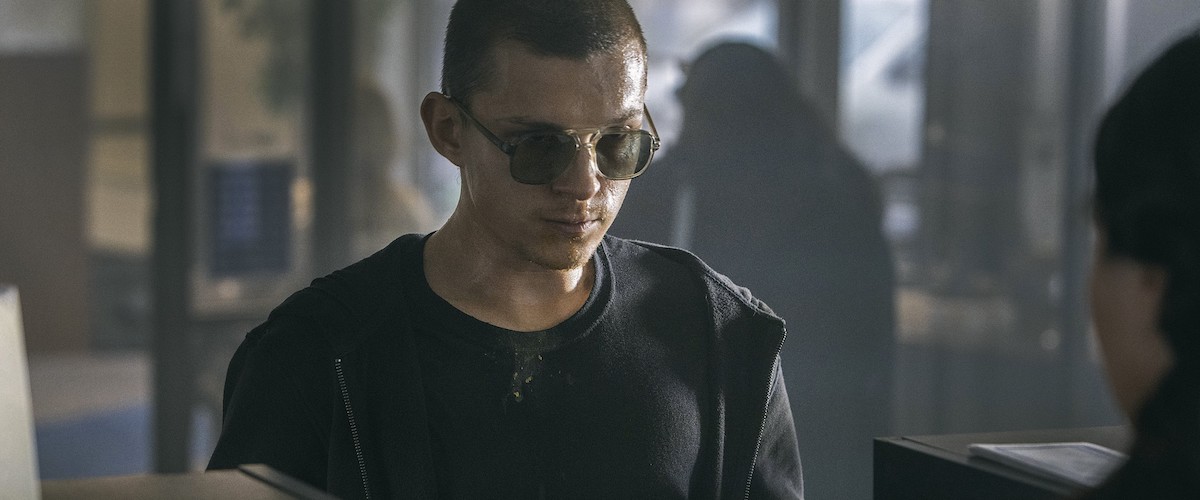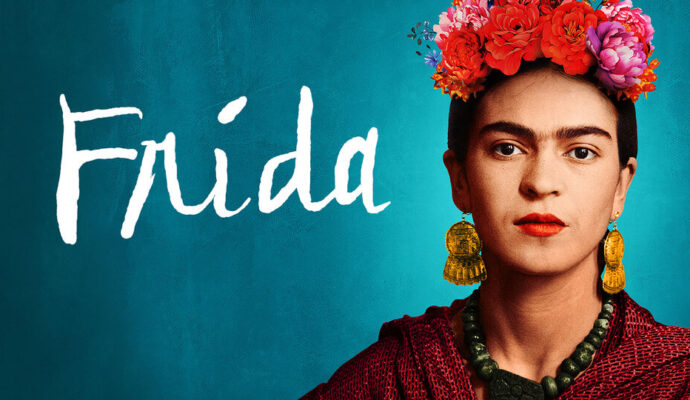“Cherry” – “My one true accomplishment was not dying.” – Cherry (Tom Holland)
Cherry, a 21-year-old Iraq War vet, finds himself back in the U.S., and more specifically, a high school gymnasium. A big band celebrates his and other local heroes’ return with genuine pomp and circumstance, but Cherry wasn’t impressed with his two years of service, so he broke the fourth wall and declared the aforementioned statement.
Cherry breaks the fourth wall a lot in directors Anthony and Joe Russo’s adaptation of Nico Walker’s novel, a loosely-based autobiographical book, and the on-screen story is littered with winding and painful misdeeds and missteps.
It’s a cautionary tale, but the movie unfortunately makes narrative slip-ups as well, despite the thoughtful warnings to not follow Cherry’s ill-placed footsteps. Rather than walking away with emotional, empathetic attachments, I felt distant and disconnected from the material, which attempts both playful and somber tones, but the film doesn’t reach its intended highs and lows. “Cherry” doesn’t have the magic of, say, Paul Thomas Anderson’s “Boogie Nights” (1997), a movie that lays down a foundation of genuine buffoonery to prepare for the stark gravity and depravity that eventually arrive in the second and third acts.
In the first act, we meet Cherry, and it’s 2007. He’s just 23 years old, but our young protagonist is a well-experienced bank robber with a minimalist approach. Typically, he’ll place a dollar bill at a teller’s counter with “I have a gun” written in red ink on the front and “This is a robbery” scribed on the back. Sometimes he wears a mask, and other times; he doesn’t.
His approach doesn’t seem terribly lucrative, and it’s not. Cherry’s not pulling down millions with this questionable vocation, and look, he should’ve been caught about two-dozen times, but let’s not get ahead of ourselves. The Russos then send us on a time machine back to 2002, when the 18-year-old Cherry starts college, as he peculiarly narrates the film in a down-beaten, monotone cadence that rivals Ben Stein’s “Bueller? Bueller?”-teacher from “Ferris Bueller’s Day Off” (1986), but with less pizazz.
Cherry’s/Holland’s narration-tone never clears one high hurdle throughout the 135-minute film, but then again, the young man carries a low-grade depression and eventually caves into a deep-rooted opioid addiction. So, I suppose Holland’s choice fits, and yes, drug addiction is the aforementioned cautionary tale.
The film chronicles one man’s life, but rather than Cherry taking active, passionate steps – whether it’s falling in love, joining the army, witnessing (but not facing) Middle East combat, and returning home in Ohio to fall into drugs – he sleepwalks through these events. In fact, save one horribly knotty problem concerning a safe that’s chock full of drugs, screenwriters Angela Russo-Otstot and Jessica Goldberg offer no light moments, and Holland is hamstrung and held in check from providing even a hint of his boyish, spirited persona. Although, Tom’s performance makes one temporarily forget about his famous Peter Parker turn. He does carry a believable range that delves somewhere between indifference and despair.
That’s by design, but his co-stars and other plot threads blend into – and become indistinguishable – with the film’s muted backdrop, as songs by Mountain and Grand Funk Railroad pop into earshot that add to the on-screen misery, as well as our own. For the record, the film is set between 2002 and 2007, so System of a Down and Pearl Jam seem like more timely musical choices. Then again, when your lead character declares that his one true accomplishment was not dying, I suppose any music choice will do.
Let’s plan on “All by Myself” by Eric Carmen and “Alone Again (Naturally)” by Gilbert O’Sullivan for the sequel.
⭐ 1/2 out of ⭐⭐⭐⭐
Image credits: AGBO, AppleTV+; Trailer credits: ONE Media




